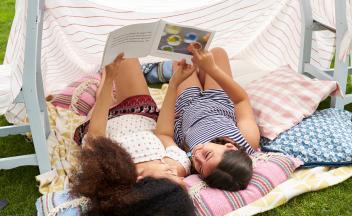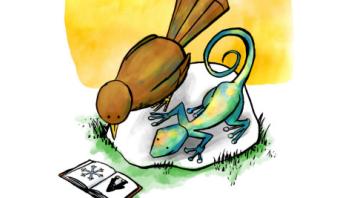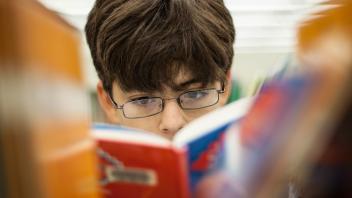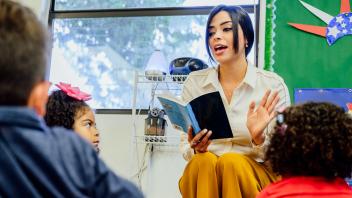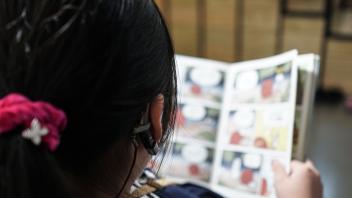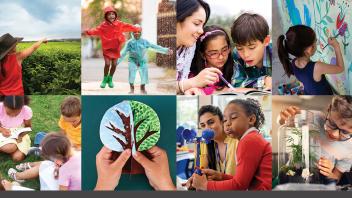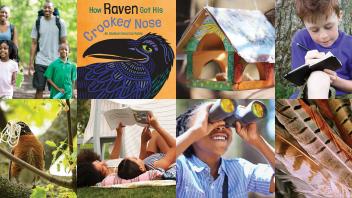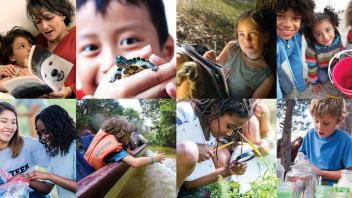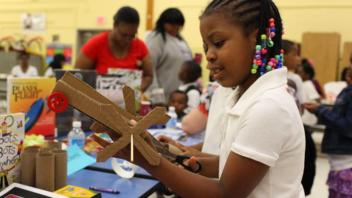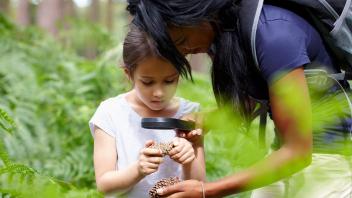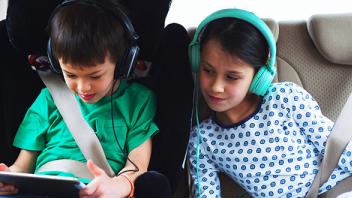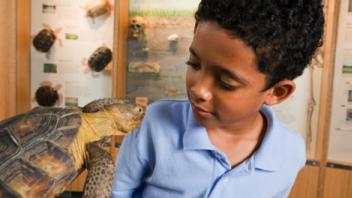Summer is …
… when kids to shift from school-based schedules to a different rhythm. Many kids are in community programs or camps for part of most of the day, while others will have much less structure for their long summer days. For all kids, summer offers an opportunity to read and learn at a different pace, but it’s important to keep children’s minds engaged.
Our reading, writing, and thinking muscles need exercise all year round! Here are some ideas about how to make summer a great time for reading, writing, exploring, thinking, creating, and learning with your kids.
The importance of summer reading, writing, and learning
Try to incorporate lots of reading, writing, and hands-on learning into your child’s summer. Here’s what all that enrichment can do:
Prevent the “summer slide”
If learning slows down over the summer break, kids can lose some of the academic gains they made during the school year — what educators call the “summer slide.” This can be especially true for kids who are already struggling academically. Reading, writing, and learning over the summer can help keep your child’s skills sharp and be sure they are ready for the new school year in the fall.
Build vocabulary and comprehension
Reading comprehension is the ability to understand what you read. It’s an essential skill for your child’s academic success, and it can be improved by reading regularly. Summer reading exposes your child to new vocabulary — and the more words a child knows, the better they will be able to understand what they read. Reading widely across different genres also gives kids more opportunities to wrestle with more challenging books, and understand how stories and other kinds of texts are structured.
Strengthen writing skills
It’s important for kids to keep writing during the summer, too. Think about low-stakes writing — such as creating a grocery list for a summer picnic, keeping a nature journal, writing postcards to family members, or writing a persuasive letter to parents about fun things to do together this summer. And as your child is building vocabulary through reading, give them a chance to practice using some of these new words in their own writing.
Learn new things — and build background knowledge
Summer reading, writing, and hands-on learning can be a great way for children to expand their knowledge and understanding of the world around them.. There are so many wonderful books for kids on every topic under the sun and in any genre — fiction, historical fiction, fantasy, poetry, science fiction, biography, and informational books. Encourage your child to try a new topic or genre — and don’t forget the graphic novels and audiobooks!
Summer reading is a great way to learn about different cultures and time periods. You can travel the world without ever leaving your couch.”
Laurie Halse Anderson
The summer slide
There are a number of reasons why the summer slide happens. Children don’t have the same structure and support during the summer as they do during the school year. They may not have access to books, computers, or other educational resources. They may also spend more time watching TV, playing video games, or doing other activities that don’t require them to use their academic skills.
Children’s brains need to be engaged in order to stay sharp. If children don’t use their academic skills over the summer, those skills will start to fade. This is especially true for younger children, whose brains are still developing.
Why does summer reading matter so much?
Research has consistently shown that summer reading loss is one of the most significant causes of the achievement gap between poorer and wealthier students. On average, economically disadvantaged students lose more than two months of reading achievement over the summer months, compared with slight gains made by middle-class students.
By sixth grade, the cumulative effect of summer reading loss creates a gap of 18 months or more between struggling and proficient readers. Over time, this summer reading loss accounts for about two-thirds of the gap between economically disadvantaged students and their wealthier peers. Children who start off behind often stay behind — struggling in middle and high school and dropping out of high school at higher than average rates.
Kids who don’t have educationally rich summers will be behind their peers by the time they reach the end of the fifth grade … Much like we would expect an athlete or a musician’s performance to suffer if they didn’t practice regularly, the same thing is true for young people when it comes to reading performance.”
Ron Fairchild, Founding CEO, National Summer Learning Association
Keep the learning faucet on!
By taking steps to keep your child’s mind active over the summer, you can help them stay ahead academically and avoid the summer slide. Here are some ideas to try:
- Read with your child every day, and make sure that your child has access to books at home.
- Visit the library often, and take advantage of any programs they offer. Libraries are now doing much more than story time hour — they also offer movie nights, reading contests, scavenger hunts, maker labs, and more.
- Give kids a chance to exercise different writing muscles — from poetry to persuasive writing. Browse these ideas from our sister project, Start with a Book: Writing Ideas for Kids .
- Set aside some time each day for educational activities, such as puzzles and word or prediction games.
- Connect what kids are reading to hands-on activities — such as paper crafts, model-making, simple science experiments, cooking, map-making, or collection boxes. Our sister project, Start with a Book , has lots of kid-friendly topics to explore.
- If you are able, enroll your child in a community summer camp or program that mixes fun with academic enrichment.
- Encourage family reading time, where everyone gathers together to read independently (or for pre-readers, look at picture books silently). When your child sees you reading, it shows that you enjoy reading!
- Talk to your child about books. Ask about the books they are reading, and share your own thoughts and ideas about books. This can help to spark conversations about books and encourage your child to think critically about what they are reading.
- Consider starting a kid’s book club. Book clubs can strengthen the social-emotional aspect of reading — sharing favorite books and authors, or talking about characters that reflect your own life or help you understand someone else’s. The key is to keep the club as kid-centered as possible. These tips from NEA’s Read Across America can help: Book Club Basics.
- Explore local places to visit that reinforce what your child is reading about. If it’s bugs and birds, take a trip to your local nature center. If it’s stars and planets, find out where the closest planetarium is and sit in on a show. If it’s music, look for a free outdoor summer concert series nearby.
- Make reading fun! Create a reading nook or tent, listen to audiobooks, or read while doing other activities such as drawing or playing games.
The Home Front
Meet Wendy Bostic, a mother of two young children in suburban Washington, D.C., who knows that taking a vacation from school doesn’t have to be a vacation from learning. During the summer, she makes a conscious effort to keep her two young children engaged — with reading, regular trips to the library, and exploring the world around them through local field trips.
Finding great books
Books & Authors
Themed Booklists
Books & Authors
Book Finder
Books & Authors
Choosing and Using Kids’ Books
Children’s Books
Great Read Alouds for Kids: Babies to Grade 3
Children’s Books
Favorite Books for Kids with Learning and Attention Issues
Ideas for hands-on learning
Visit our sister site, Start with a Book , for topic-based books paired with hands-on activities for reading, exploring, and learning about our world. You’ll also find a library of DIY toolkits and guides to inspire active learning all year round.
Start with a Book
Weather Wonders
Start with a Book
Tune In! All About Music
Start with a Book
Bird Buddies
Start with a Book
Space Rangers
Start with a Book
River Rangers
Background Knowledge
Bilingual Reading Adventure Packs
Tip sheets in English and Spanish
Growing Readers
Family Literacy Activities
Growing Readers
STEM Activities
Growing Readers
Summer Learning
Activities
Riding and Reading
Background Knowledge
The Night Before the Museum
Background Knowledge
Summer Learning, Side-by-Side
Featured video
Browse our summer reading resource library
Learn more about summer reading, writing, and learning with children through our articles, tips for parents, video, and research briefs. Visit our Summer Reading section
